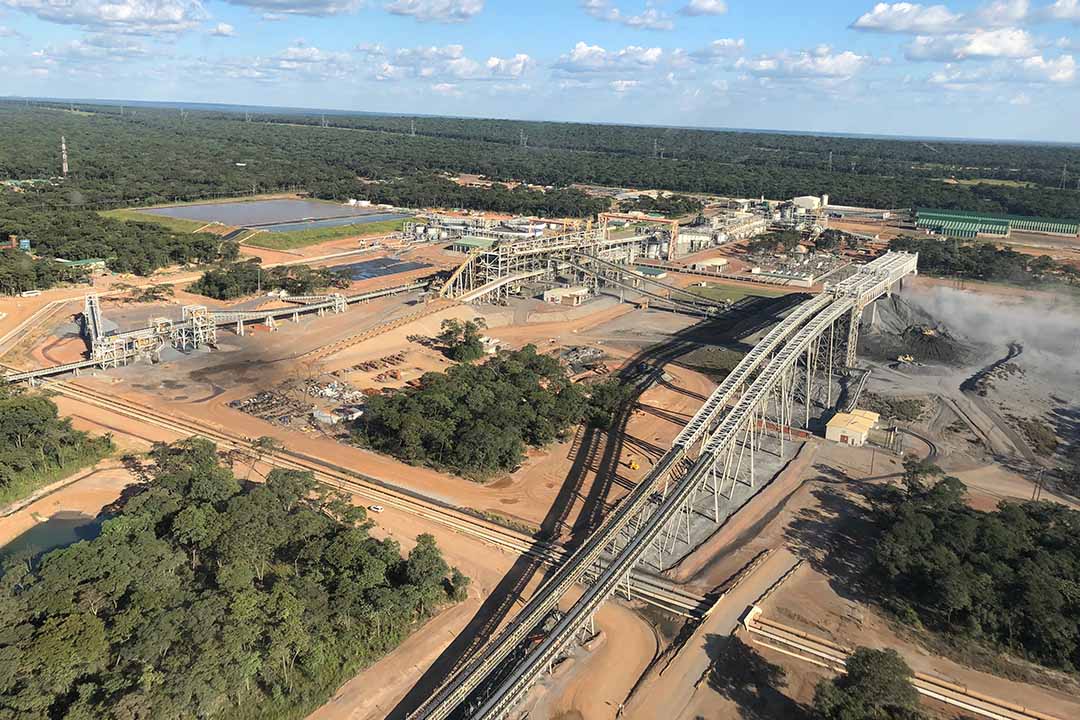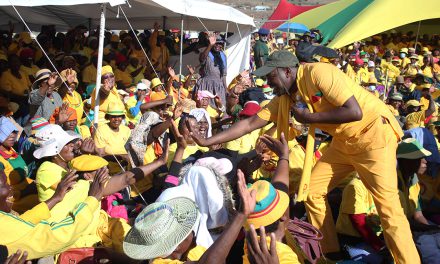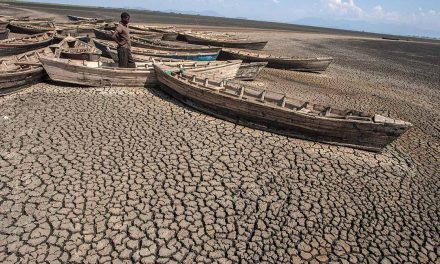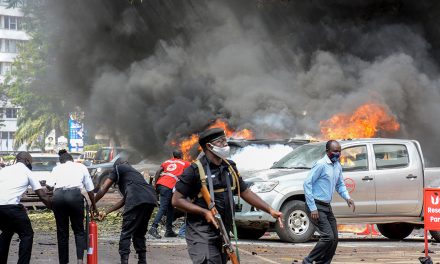In their excellent 2009 book, Violence and Social Orders, the late Douglass North and his co-authors make a compelling case that, throughout history, the central problem of development is violence. To develop, actors must agree to pool rents and disarm. This only occurs when warring elites recognise that the value of pooled rents is greater than rents gained through war. They must also be mutually assured that their opponents will credibly disarm and share the rents as agreed. To achieve this, there has to at least be credible ‘rule of law’ among elites.
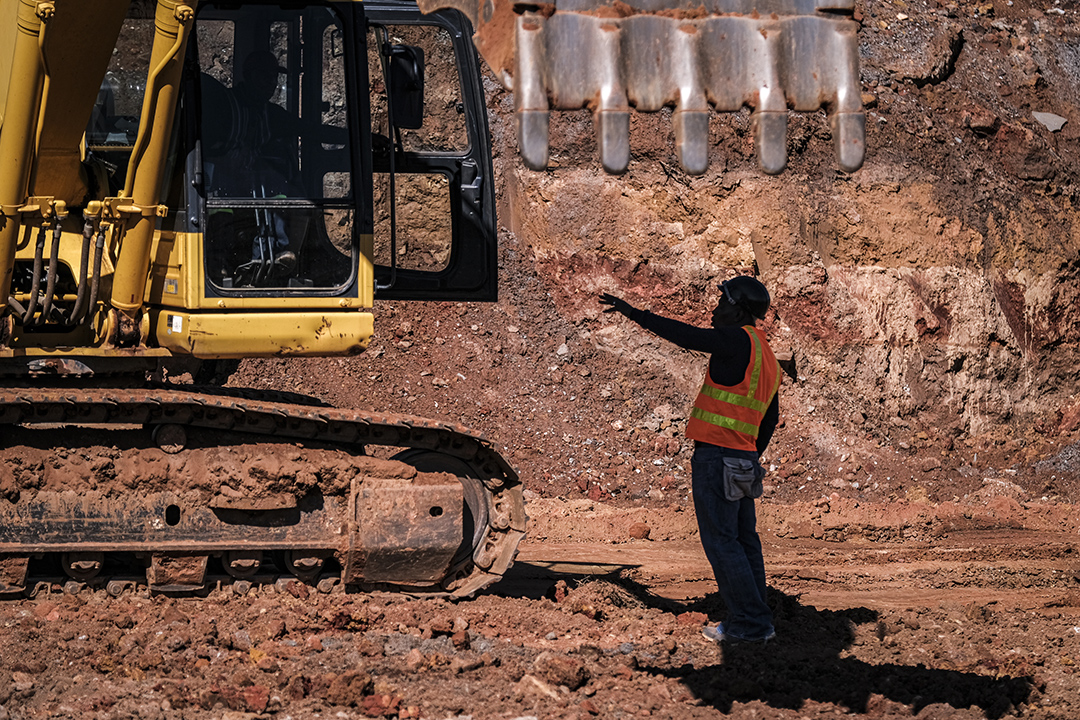
A previously operational gold mine being rehabilitated in the Johannesburg CBD in April 2022. Mining remains a key to unlocking South Africa’s growth potential. Photo: EMMANUEL CROSET/AFP
North and his co-authors divide the world into three states. On the left side of the continuum is Chaos – countries with little to no governance. In the middle are the majority, defined as ‘limited access orders’ (LAOs), in which citizens have limited access to political and economic opportunity. Elites call the shots. On the far right of the continuum are a handful of countries defined as ‘open access orders’ (OAOs). Here, institutions function for the benefit of citizens and elites are held accountable by those same citizens for how they allocate public resources.
Within LAOs, countries are categorised as fragile, basic or mature. By 2008, I’d have argued that – on several criteria – South Africa was moving towards a mature LAO. At the time of writing, I’d have to argue that the country has entered the ‘fragile’ category. We still have some functional institutions, but by and large we are flailing and the markers of heading towards chaos are all too clear. Before we go further, it is helpful to adopt Avner Greif’s definition of institutions – the social systems (norms, values and culture) that motivate regular human behaviour. They are not just organisations, though organisations are expressions of institutions. Put another way, institutions provide the scaffolding that generates the incentives that govern a country’s trajectory.
South Africa inherited a mess in 1994, a country governed by elites for centuries, not just inadvertently excluding the majority, but purposefully doing so. The rent pool was large and distributed among a small band of beneficiaries. Making governance decisions in that context was extremely challenging. An unlikely institution evolved out of this negotiated revolution – a constitution. Constitutions are typically the key institution under which all other institutions operate. Our constitution upholds the rule of law as the key governing principle. But a constitution is only as strong as the judicial system that supports it. That judicial system, and other arms of government – the executive and the legislature – are only as strong as the underlying norms, values and culture that characterise our society.
So, the million-dollar question is what has changed so radically since 2008? Aside from a global financial crisis and multiple exogenous shocks, the truth is that corruption has permeated our society. Corruption is best defined as the misappropriation of public resources for private gain. It typically starts in so-called ‘petty’ ways – the bribing of a traffic officer, for instance. But it soon metastasizes if left unchecked. Contract skimming, for instance, becomes normalised. Note that this is not only perpetrated by the public sector. The private sector always plays a facilitating role in corruption, as financial institutions either launder money or fail to engage in the due diligence required to prevent ill-gotten gain from being legitimised. Once corruption has moved into the domain of permeating both the private and public sectors, organised crime can gain a foothold, as it has done so prominently in South Africa. There is only one state worse than this, and that is when the state itself is essentially run by a corrupt organisation. The extent of ‘state capture’, for instance, is evidence of grand corruption in South Africa.
Corruption, in turn, has corroded the very institutions that were arguably moving us towards a mature LAO, and were once capable of at least stemming corruption. On the one hand, it is a saving grace that we have a judiciary capable of providing the Zondo Commission’s findings and ruling against members of the executive without fear or favour. On the other hand, it is a travesty that the National Prosecuting Authority has been so hollowed out under ‘state capture’ that it is now incapable of bringing to justice those who have stolen billions from the country.
This state of pervasive corruption moves us towards chaos because it makes it extremely expensive and difficult for responsible companies to do business in South Africa. Our recent greylisting, for instance – for failure to adequately prevent money laundering from organised crime and potential terrorism financing – doesn’t just tarnish our reputation, it affects our credit rating outlook. This in turn increases our debt servicing costs. The more of the annual budget that goes towards debt servicing, the less can be spent on necessary items like energy security and infrastructure upgrades and maintenance.
To put it theoretically again, veering towards fragility, and even Chaos, moves South Africa further away from what economists Daron Acemoglu and James Robinson call a Narrow Corridor. When government effectiveness and citizens’ ability to hold their governments to account improve simultaneously, it creates the right environment for economic dynamism to flourish and generate broad-based development. But falling outside that corridor makes growth rather challenging. Corruption has a direct bearing on a state’s ability to deliver services effectively, provide justice and protect property rights. These are basic requirements of the state. South Africa’s inability to perform them has resulted in outrage from the business sector. Large corporates are increasingly voicing their disapproval in public, a relatively unprecedented feature of our post-1994 society.
The mining industry, to its credit, has always been vocal and honest about the government’s failures. To survive, it will now have to pour resources not only into sustainably extracting resources from the ground, but into anti-corruption institutional capacity too. The private sector, more broadly, will have to strengthen the national prosecuting authority and Chapter Nine institutions (the organisations that Chapter Nine of the Constitution has enshrined to ensure accountability and uphold the rule of law).
Mining remains a key to unlocking South Africa’s growth potential. The corruption that permeates the Department of Mineral Resources and Energy, and the more overt mine-gate extortion exercised by armed gangs, are just two challenges that have to be urgently overcome. One quick way to prevent corruption in the licensing allocation system, as I’ve repeatedly argued in these pages, is to implement a digital online cadastre system that is incorruptible. That it hasn’t happened yet is only too obvious a sign that too many officials think that it’s their ‘time to eat.’
It is, in summary, difficult to imagine that South Africa can reverse its trajectory and move back towards maturity unless there is a change in power at the highest level. Even then, such a change will not necessarily lead to a change in the norms, values and culture that have generated the current situation. When corruption is normalised, the belief systems that led to its normalisation have to change from ‘it’s our turn to eat’ to ‘how can we best serve the citizens of this country’? Moving from a self-serving norm to a self-sacrificial one requires nothing short of moral revival.
Dr Ross Harvey is a natural resource economist and policy analyst, and he has been dealing with governance issues in various forms across this sector since 2007. He has a PhD in economics from the University of Cape Town, and his thesis research focused on the political economy of oil and institutional development in Angola and Nigeria. While completing his PhD, Ross worked as a senior researcher on extractive industries and wildlife governance at the South African Institute of International Affairs (SAIIA), and in May 2019 became an independent conservation consultant. Ross’s task at GGA is to establish a non-renewable natural resources project (extractive industries) to ensure that the industry becomes genuinely sustainable and contributes to Africa achieving the Sustainable Development Goals (SDGs). Ross was appointed Director of Research and Programmes at GGA in May 2020.


